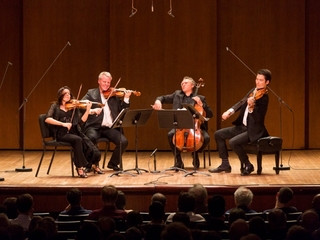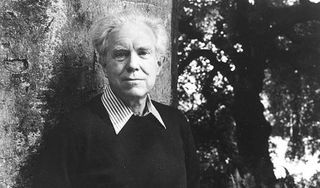|
Back
Wearing Their Arts On Their Sleeves New York
92nd Street Y
12/09/2015 -
“Last Words”
Elliott Carter: Fragments for String Quartet String Quartet No. 5
Leos Janácek: String Quartet No. 2 “Intimate Letters”
Ludwig van Beethoven: String Quartet No. 16 in F Major, Op. 135
Pacifica Quartet: Simin Ganatra, Sibbi Bernhardsson (Violins), Masumi Per Rostad (Viola), Brandon Vamos (Cello)

Pacifica Quartet at 92nd Street Y (© Richard Termine)
“The fragrance of your body, the glow of your kisses, these notes of mine kiss all of you.” Leos Janácek to Kamila Stösslová.
No Tower of Babel (quite the opposite), but the Pacifica Quartet spoke three languages last night that could have been cryptic, inscrutable, hermetic.
Unless, of course, you listened to the music.
Possibly some were alienated by Elliott Carter’s two pieces, wasting time trying to find mathematical structures on which to glue the notes. Or Leos Janácek’s emotional utterances that resembled verbal exclamations. Or even Ludwig van Beethoven’s string quartet of joy, his possible final work, which should have had Promethean pathos beneath the simple melodies.
Had they sat back and breathed in the notes themselves (and this highly attentive 92nd Street Y audience mainly did), they would have heard a recital of feeling and excitement.
After two decades, the Pacifica always offers excitement, even in works heard many times. Here, though, we had a concert, supposedly of “final pieces” (which wasn’t actually true), and not a single note of plaint or despondency.
That was certainly true with the difficult Janácek “Intimate Letters”, love notes from a 74-year-old–and apparently very virile–man to his 35-year-old adoréd friend. No program notes–and certainly no description of the four movements–could do justice to this over-dramatic, passionately operatic music Janáček was hardly concerned with the music of Europe in 1927. He wore his art upon his sleeves, and wasn’t ashamed to write down every emotion.
And this is the way Pacifica played it. The violin flutters, the explosions of dissonance, the oh so charming dances leading to bursts of manic lines. When Alban Berg composed his dances in Lyric Suite, he had the good sense to segue them to other lines. Janácek, though, was an ill-mannered Czech, not a cultivated Austrian. He wrote the way he felt.
Any quartet which tried to censor such unremitting euphoria would do an injustice to the composer. Pacifica let their bows fly, their gorgeous sounds were given leave to osculate and embrace, ferment and fornicate. It was a ravishing performance.

E. Carter (© Nicholas Tucker)
Obviously this was a different language than two of Elliott Carter’s later works, written when he was 96 and 101 years old. Like Janácek, Mr. Carter was not to be followed literally, except by the players. The pieces in his final period (and much of the earlier times) were, like Janácek, also emotional outbursts. But never human outbursts translated to fiddles. They were musical bursts, of fun and fire, that were to remain pure music.
One heard this in the Two Fragments. the first one beginning with a simple two-note theme which was dissected, castrated, then resurrected all within four minutes. The Second Fragment was even simpler. I don’t know if Mr. Carter enjoyed the music of the film Deliverance, the great Dueling Banjos, yet nothing could be more apposite. First we had (with minor background noises), second violin versus, viola, then second violin versus cello, all of it ending in happy harmony.
The Pacifica Quartet claims it took hours (with the composer in attendance) to get them right. But it did sound like great fun for these virtuosi.
The longer Fifth Quartet weaved a more tangled skein, with connected movements. He once claimed these were “patterns of human behavior”. I.e. arguments, concords, disagreements, rages and raptures. But none had the literal human feelings of Janácek. They were purely musical.
Again, looking at which section was being played would have been a disaster, since you’d miss the Pacifica Quartet humor and melodrama together.
Surprisingly, the final work, Beethoven’s supposed last string quartet, did not come as a relief. In a way, it was complementary to the first works. Of course far less astringent (unlike his other late quartets), and the music didn’t explode out irrationally (ditto for the late quartets). Yet for all its supposed levity, its simplicity, the almost childish last theme, Beethoven was not alien to this other music.
Like Janácek, he gave music to words. Janácek was unspoken, Beethoven was cryptic (“Must it be? It must be.”) Like Carter, he demanded attention from the audience. That final movement may have been almost adolescent in form, but oh, what he could do with that folkish theme.
Above all, this was a human, not a Promethean quartet, and the Pacifica gave it that lightness of touch, the quick bowing, the sparkle in three of the movements. The exception was the third Lento assai. Perhaps only in the slow movement of the Ninth Symphony did Beethoven give vent to such purely gorgeous moments, such ethereal thoughts.
The entire concert (along with the delicious Piazzolla Tango For Four encore) was human size writ large. Yet in that single Beethoven movement, the Pacifica Quartet reached for the stars. They didn’t levitate. But they came near to ascension.
Harry Rolnick
|